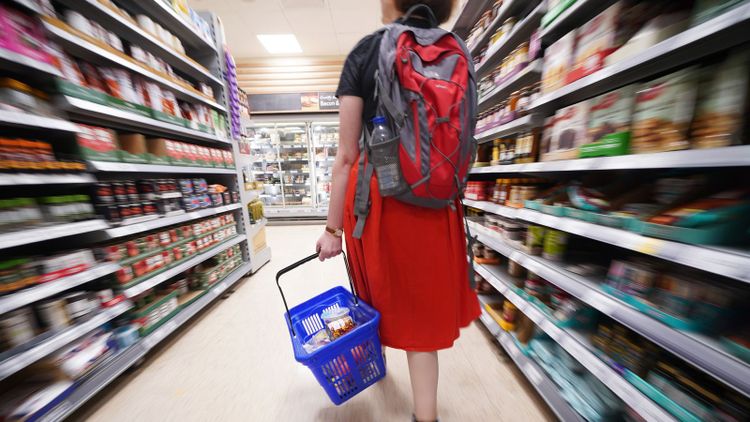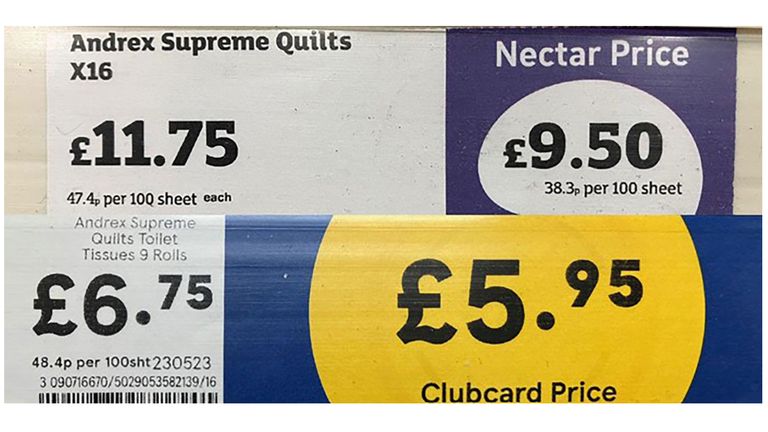Tesco Clubcard under fire: Supermarket reported to regulator amid allegations offers lack transparency

A group that represents consumers has filed a complaint against Tesco with the competition regulator while they investigate whether the grocery industry is overcharging customers.

Which? reported that they approached the Competition and Markets Authority (CMA) to express their grievances regarding unclear pricing on most of the food and drink promotions offered by the shop, amidst the ongoing issue of rising household expenses.
There was an accusation that the biggest supermarket in the UK might be violating the law. Tesco has firmly rejected that claim.
The focus is on the utilization of unit pricing by the merchant, which includes both in-person and online shopping.
The fine details on the pricing tags displayed on shelves include information like the cost per 100g for items such as jam, or the cost per sheet for toilet paper rolls.
The prices for each unit of a product are beneficial for customers because they allow them to compare prices for products of different sizes and determine which one is more affordable.
Which? claims that Tesco is not being clear in their policies and this is causing additional challenges for struggling shoppers.
According to reports, Tesco's choice to omit unit pricing from their Clubcard offers may constitute a deceptive action, which goes against the Consumer Protection From Unfair Trading Regulations 2008 (CPRs).
The addition stated that sellers are obligated to refrain from engaging in "unjustifiable business behaviors" under the CPRs.
According to Which?, if these regulations are applied, the cost per unit could be viewed as significant information that the majority of individuals would require to make an educated judgement on how to obtain the most value from their purchase.
Which? discovered problems with the way supermarkets display unit pricing. However, Tesco especially draws attention as it always seems to leave out unit pricing in its Clubcard special offers. These promotions now make up almost all of Tesco's sales promotions on food items.
from inflation by raising their prices, according to a report from the British Retail Consortium. The report found that while there has been an increase in the cost of food and non-food items, it is largely due to global supply chain issues and rising commodity costs, rather than supermarkets taking advantage of the situation. The report also noted that many retailers are absorbing some of the cost increases to avoid passing them on entirely to consumers. This is good news for shoppers who are facing higher prices at the checkout. The report's findings should help to ease concerns that businesses are contributing to inflation, which is currently at a 10-year high in the UK. However, the report also highlighted the need for government action to address supply chain issues and support businesses affected by rising costs. Overall, while businesses may be feeling the pinch from inflation, it seems they are not the ones causing it.

Is the phenomenon of 'greedflation' responsible for the maintenance of high prices? Explanation: The statement is rewritten using different words while maintaining the original meaning.
The team filed a formal grievance during the CMA's examination into whether supermarkets are gaining an unreasonable amount of profit by marking up their prices.
The grocery industry has refuted claims of contributing to "greedflation," based on initial investigations conducted by Sky News, which showed a lack of proof of profiteering during the beginning months of the year.
Despite this, the part of the Consumer Prices Index (CPI) that has remained consistent is food inflation. This has caused the rate to stay higher than anticipated, adding pressure to families' finances.
According to the Office for National Statistics (ONS), the most recent assessment of inflation for food and non-alcoholic beverages revealed that it was still high, hovering above 19% for the year up to April.
The government is very eager to lower the inflation of food in order to fulfill its promise to decrease the inflation overall by half for the current year.
The government officials are thinking about implementing a limit, and at the same time, urging the entire food sector to take action.
According to the industry, financial assistance from taxpayers for energy expenses in the supply chain will effectively decrease prices.
To have an easier time viewing the video, we recommend using the Chrome internet browser.
Tesco denies claim of 'ambiguous' labeling Tesco is standing firm following allegations that their product labeling is difficult to understand. It has been suggested that shoppers are finding it difficult to determine whether products are fresh or frozen, as well as their origins, due to confusing labeling. However, Tesco has rejected these accusations, stating that their labeling is "clear and accurate". A spokesperson for Tesco has emphasized that they take labeling very seriously and are constantly looking for ways to improve clarity for their customers. They have encouraged any shoppers who have concerns or queries about labeling to get in touch with them directly. As a leading supermarket chain, Tesco understands the importance of transparent and unambiguous labeling. They are committed to ensuring that their customers can make informed decisions when it comes to the products they buy.
Next week, Tesco is set to disclose its trading performance to the City. As per Sky News, Tesco claimed that it has complied with all legal guidance on the matter of unit prices.
Someone speaking on behalf of the company stated: "It's crucial for us to offer fantastic value and transparent pricing. We make sure to follow the rules and regulations, which is why we requested an evaluation from Trading Standards on our utilization of Clubcard Prices.
They officially approved our labeling, verifying that it satisfies the existing legal obligations and standards.
We agree with the need for more precise rules concerning regulations in this field, as it's essential for the benefit of companies and customers. We're working hard to find ways to improve how we present pricing information to our customers.
Even though we are following all the current regulations, it is disheartening that Which? has decided to make unsupported accusations against our Clubcard Prices program. This program benefits millions of households by giving them amazing deals every week, and has the potential to save shoppers up to £351 per year.
According to Sue Davies, who is the head of food policy at Which?, the pricing structure of Tesco's Clubcard is ambiguous at best, and it can be problematic for customers who are dealing with high food prices. Furthermore, this ambiguity could potentially be a violation of the law.
The largest supermarket in the UK is failing to meet a satisfactory level of performance.
To serve its customers better, Tesco needs to take action right away and implement transparent unit prices for all promotions, not just Clubcard offers, to make it easier for shoppers to identify products with the most value.
The current examination of unit pricing being conducted by a representative of the CMA led to a response: "We are examining how supermarkets present unit pricing details for products that are included in promotions, such as loyalty programs."
"We plan to reveal our discoveries in the month of July."



































































